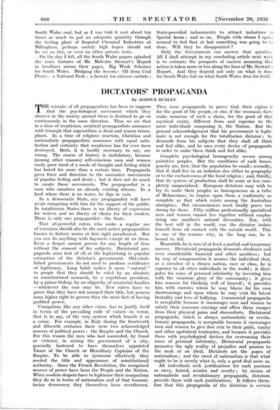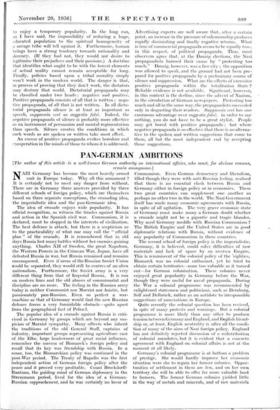DICTATORS' PROPAGANDA By ALDOUS HUXLEY T HE mistake of all propagandists
has been to suppose that the psychological movement which they observe in the society around them is destined to go on continuously in the same direction. Thus we see that in a time of scepticism, sceptical propagandists announce with triumph that superstition is dead and reason trium- phant. In a time of religions reaction, Christian and nationalistic propagandists announce with equal satis- faction and certainty that scepticism has for ever been destroyed. Both, it is hardly necessary to say, are wrong. The course of history is undulatory, because (among other reasons) self-conscious men and women easily grow tired of a mode of thought and feeling which has lasted for more than a certain time. Propaganda gives force and direction to the successive movements of popular feeling and desire ; but it does not do much to create those movements. The propagandist is a man who canalises an already existing stream. In a land where there is no water, he digs in vain.
In a democratic State, any propagandist will have rivals competing with him for the support of the public. In totalitarian States there is no liberty of expression for writers and no liberty of choice for their readers. There is only one propagandist—the State.
That all-powerful rulers who make a regular use of terrorism should also be the most active propagandists known to history seems at first sight paradoxical. But you can do anything with bayonets except sit on them. Even a despot cannot govern for any length of time without the consent of his subjects. Dictatorial pro- paganda aims first of all at the legitimising in popular estimation of the dictator's government. Old-estab- lished governments do not need to produce certificates of legitimacy. Long habit makes it seem " natural " to people that they should be ruled by an absolute or constitutional monarch, by a republican president, by a prince-bishop, by an oligarchy of senatorial families —whichever the case may be. New rulers have to prove that they have not usurped their title, but possess some higher right to govern than the mere fact of having grabbed power.
Usurpation, like any other crime, has to justify itself in terms of the prevailing code of values—in terms, that is to say, of the very system which brands it as a crime. For example, in Italy during the fourteenth and fifteenth centuries there were two acknowledged sources of political power : the Empire and the Church. For this reason the men who had succeeded, by fraud Or violence, in seizing the government of a city, generally hastened to have themselves appointed Vicars of the Church or Hereditary Captains of the Empire. To be able to tyrannise effectively they needed the title and appearance of constitutional authority. Since the French Revolution, the recognised sources of power have been the People and the Nation. When modern despots have to legitimise their usurpations they do so in terms of nationalism and of that humani- tarian democracy they themselves have overthrown: They issue propaganda to prove that their regime is for the good of the people, or else, if the economic facts make nonsense of such a claim, for the good of that mystical entity, different from and superior to the mere individuals composing it, the Nation. But the general acknowledgement that his government is legiti- mate is not enough for the totalitarian dictator ; he demands from his subjects that they shall all think and feel alike, and he uses every device of propaganda in order to make them think and feel alike.
Complete psychological homogeneity occurs among primitive peoples. But the conditions of such homo- geneity are, first, that the population be small ; secondly, that it shall live in an isolation due either to geography or to the exclusiveness of the local religion ; and, thirdly, that its system of production shall be more or less com- pletely unspecialised. European dictators may wish to try to make their peoples as homogeneous as a tribe of Melanesians, to impose upon them a conformity as complete • as that which exists among the Australian aborigines. But circumstances must finally prove too strong for them. Fifty million professionally specialised men and women cannot live together without empha- sising one another's natural diversities. Nor, with the best will in the world, can the dictator isolate himself from all contact with the outside world. ThiS is one of the reasons why, in the long run, he is bound to fail.
Meanwhile, he is sure of at least a partial and tempormy success. Dictatorial propaganda demands obedience and even considerable financial and other sacrifices ; but by way of compensation it assures the individual that, as a member of a chosen nation, race .or class, he is superior to all other individuals in the world; it dissi- pates his sense of personal inferiority by investing him with the vicarious glory of the community ; it gives him reasons for thinking well of himself ; it provides him with enemies whom he may blarrie for his own shortcomings and upon whom he may vent his latent brutality and love of bullying. Commercial propaganda is acceptable because it encourages men and women to satisfy their sensuous cravings and offers them escapes from their physical pains and discomforts. Dictatorial propaganda, which is always nationalistic or revolu- tionary propaganda, is acceptable because it encourages men and women to give free rein to their pride, vanity and other egotistical tendencies, and because it provides them with psychological devices for overcoming their sense of personal inferiority. Dictatorial propaganda promotes the ugly reality of prejudice and passion to the rank of an ideal. Dictators are the popes of nationalism ; and the creed of nationalism is that what ought to be is merely what is, only a good deal more so. All individuals seek justifications for such passions as envy, hatred, avarice and cruelty ; by . means of nationalistic and revolutionary propaganda, dictators provide them with such justifications. It follows there; fore that this propaganda of the dictatOri is certain to enjoy a temporary popularity. In the long run, as I have said, the impossibility of reducing a huge, educated population to the spiritual homogeneity of a savage tribe will tell against it. Furthermore, human beings have a strong tendency towards rationality and decency. (If they had not, they would not desire to legitimise their prejudices and their passions.) A doctrine that identifies what ought to be with the lowest elements of actual reality cannot remain acceptable for long. Finally, policies based upon a tribal morality simply won't work in the modern world. The danger is that, in process of proving that they don't work, the dictators may destroy that world. Dictatorial propaganda may be classified under two heads : negative and positive. Positive propaganda consists of all that is written ; nega- tive propaganda, of all that is not written. - In all dicta- torial propaganda silence is at least as important as speech, .suppressio serf as suggestio falsi. Indeed, the negative propaganda of silence is probably more effective as an instrument of persuasion and mental regimentation than speech. Silence creates the conditions in which such words as are spoken or written take most effect.
An excess of positive propaganda evokes boredom and exasperation in the minds of those to whom it is addressed. Advertising experts are well aware that, after a certain point, an increase in the pressure of salesmanship produces rapidly diminishing and finally negative returns. What is true of commercial propaganda seems to be equally true, in this respect, of political propaganda. Thus, most observers agree that, at the Danzig elections, the Nazi propagandists harmed their cause by " protesting too much." Danzig, however, was a free city ; the opposition was allowed to speak, and the ground had not been pre- pared for positive propaganda by a preliminary course of silence and suppression. What are the effects of excessive positive propaganda within the totalitarian State ? Reliable evidence is not available. Significant, however, in this context is the decline, since the advent of Nazism, in the circulation of German newspapers. Protesting too much and all in the same way, the propagandists succeeded only in disgusting their readers. Suppressio rcri has one enormous advantage over suggestio falsi: in order to say nothing, you do not have to be a great stylist. People may get bored with positive propaganda ; but where negative propaganda is so effective that there is no alterna- tive to the spoken and written suggestions that come to them, all but the most independent end by accepting those suggestions.





























































 Previous page
Previous page